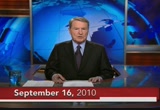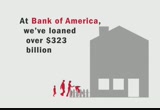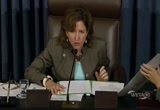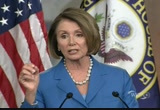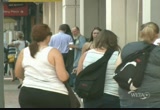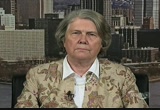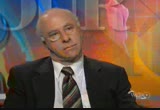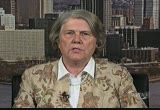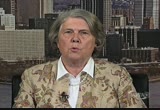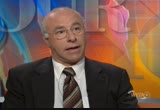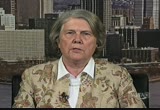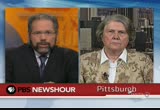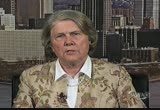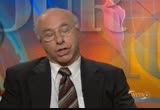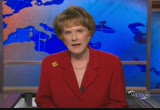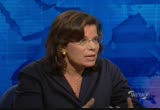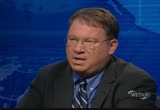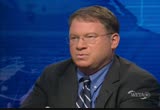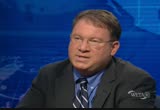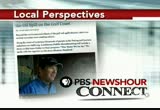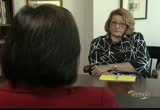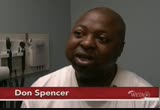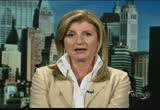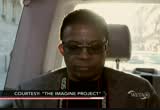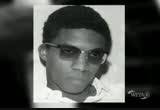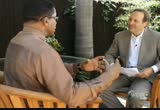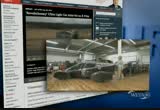tv PBS News Hour PBS September 16, 2010 7:00pm-8:00pm EDT
7:00 pm
>> lehrer: good evening. i'm jim lehrer. the census bureau announced new figures today-- one in seven americans lived in poverty and 50.7 million were uninsured last year. >> warner: and i'm margaret warner. on the "newshour" tonight, ray suarez walks economists isabel sawhill and harry holzer through these record breaking numbers and assess the impact the recession has had on the poor. >> lehrer: then, "atlantic" magazine reporter jeffrey goldberg and latin america analyst julia sweig talk about their recent conversations with fidel castro. >> warner: betty ann bowser reports from new orleans on an effort to establish clinics for people who lost health care after hurricane katrina wiped out the city's charity hospital. >> the storm, the flooding was horrific but it really was an opportunity for us to try something new and better for our patients. >> lehrer: gwen ifill has a conversation with online editor and liberal commentator arianna huffington on her new book about
7:01 pm
the declining middle class. >> warner: and jeffrey brown talks with composer and musician herbie hancock, whose 70th birthday tour fuses jazz with global beats. >> taking what happens and trying to make it work. that's something i add life >> lehrer: that's all ahead on tonight's "newshour." major funding for the pbs newshour has been provided by:
7:02 pm
>> this is the engine that connects abundant grain from the american heartland to haran's best selling whole wheat, while keeping 60 billion pounds of carbon out of the atmosphere every year. bnsf, the engine that connects us. >> and by the bill and melinda gates foundation. dedicated to the idea that all people deserve the chance to live a healthy productive life. and with the ongoing support of these institutions and foundations. and... this program was made possible by the corporation for public broadcasting. and by contributions to your pbs station from viewers like you. thank you. >> lehrer: today's reported rise in poverty underscored the depths of the recession as new
7:03 pm
data gave conflicting signals about what lies ahead. at the same time, congress labored on new ways of lifting the country out of recession. for millions of small businesses, from diners to hardware stores, a senate vote today could bring new access to credit to get them hiring again. senate democrats broke through a republican filibuster, to approve $30 billion for community banks. >> the motion is agreed to. >> lehrer: supporters said it could be leveraged into $300 billion in loans. the bill goes now to the house. but republicans, like house minority leader john boehner, said the way to boost hiring is to keep the bush-era tax cuts. they're set to expire at the end of the year. >> the sooner we get our arms around spending and the sooner we extend the current tax rates for all americans, the sooner some of the uncertainty that is
7:04 pm
clouding the picture for small businesses begins to clear up. >> lehrer: president obama wants to keep the tax cuts for the middle class, but not for better-off americans. a growing number of house democrats said they'd support extending tax relief for everyone. in turn, house speaker nancy pelosi insisted today there is no justification for that stance. >> our priority is the middle class. tax cuts for the middle class. republicans have made it clear their priority is no tax cut for the middle class, unless there's a tax cut for the wealthiest people in america. >> lehrer: for his part, the president focused on pushing exports to fuel economic recovery. he addressed his new export council and said sales of u.s. goods abroad are up 18% from last year. >> the more american companies export, the more they produce. and the more they produce, the more people they hire. and that means more jobs, good >> lehrer: on the jobs front, there was a glimmer of good
7:05 pm
news. new applications for unemployment benefits dropped to a two-month low. on the other hand, home mortgage foreclosures hit their highest level since the housing meltdown began. there were 95,000 homes repossessed last month. the pew research center reported more americans are now willing to default. 36% in pew's latest poll said it's acceptable under some circumstances to simply walk away from a mortgage. that kind of sentiment was underscored all the more by the poverty numbers in the census bureau's annual survey of u.s. households. according to numbers for 2009, 14.3%-- or one in seven americans-- were living at or below the poverty level last year. that was four million more people than the year before, and the most since 1994. the ranks of the working age poor reached the highest levels since the 1960s.
7:06 pm
in addition, the number without health insurance topped 50 million as people lost jobs, and the medical coverage that employers had provided. >> lehrer: ray suarez has more about the new poverty numbers. >> suarez: for a closer look at what's behind the bad news on poverty and the uninsured, we turn to two experts who study these matters. harry holzer is a professor of public policy at georgetown university, a fellow at the urban institute and a former chief economist for the u.s. department of labor. and, isabel sawhill, a senior fellow at the brookings institution and co-director of their center on children and families. isabel sawhill, let me start with you. what do both these numbers, the new numbers on the increase in the uninsured and the increase in those who are living in poverty tell you about the state of the american economy in 2010? >> well, obviously, ray, it's not a good story. it shows that the recession is
7:07 pm
beginning to have a major impact on the number of people with very low incomes. with so many people out of work, it's not surprising that the poverty rate has gone up in the way it has and that the uninsured has also gone up. but it is still, as you noted, the highest rate we've had since the early 1990s. >> suarez: professor holzer, we've had eight resessions in the last 50 years, but this is the steepest increase in the number and percentage of those living in poverty. what's different about this recession? >> well, very simply, this is the steepest recession in terms of the job market and that's where people's earnings and people's incomes are directly impacted. actually, so far the increase in the poverty rate is not as steep as we saw in the early 1980s when we also had a severe recession, although
7:08 pm
unfortunately i think we're not quite done. i think we're going to see the poverty rate continue to rise into 2010. this number also might have been a little worse had it not been for one positive number and that's the fact that poverty among the elderly actually went down because more of them are working in the labor market than was the case before their 401(k)s collapsed in value. >> suarez: what about children? how are they doing? they're a special concern of yours, isabel sawhill. >> that's right. the poverty rate amongst children has also increased a lot and as harry noted, this is just the beginning of what is going to be, i'm afraid, a number of years of increasing rates. we've done some projections at brookings based on historical data that suggests that the overall poverty rate will probably peak around 16% in the middle of the decade and that it
7:09 pm
will not be until the end of the decade that it gets anywheres near where it was before the recession started. so we have a long slog ahead of us in terms of a lot of people with low incomes. and once the unemployment insurance benefits that many people have relied on are increasingly exhausted and assuming the congress doesn't reup on unemployment insurance-- which i don't think they will-- then you're going see even more pain out there. >> couric: there was a lot of attention on those who were on the wrong side of the poverty line. that's about $10,000 for a single person, $22,000 for a family of four. just on the other side of that line are there millions more who are living in what a lot of americans would consider poverty but just out counted that way by the federal government? >> that's right. there's a fair amount of
7:10 pm
controversy about exactly how we measure poverty. we use a measure that was developed in 1965 when the economy was really very different and it's only been adjusted for inflation over the last 45 years. if you had an a more accurate count of the number of people who were poor according to alternative measures that some economists economists have devised, the overall number probably would be higher and you would see a lot more of those people right now between a hundred and 150% of the poverty line perhaps counted as poor. but you're right, they are not doing well also in these circumstances. >> suarez: so, ms. sawhill, help us understand who the new poor are. are they people who just didn't slide very far from a status just above the poverty line? are or there many families that have really take an calamitous fall? earlier in the program we reported on the record number of foreclosures. >> i suspect there's some from
7:11 pm
both categories, ray, and you're quite right to point out that the poverty line is a rather arbitrary measure of who's poor and who isn't. what's the difference between having an income of $26,000 and an income of $18,000? they're both very low incomes by american standards, especially if you live in one of our high-cost cities. and, by the way, the poverty measure does not adjust for geographic differences across different areas of the country. >> couric: is the safety net holding. is it different to fall into poverty now-- and these numbers are from 2009, than it was in the middle of the great society programs 40 years earlier? is it a... is there as much to help those families and there was 40 years ago? >> i think in general the safety net is not quite as strong as it was. and there's many categories of people who previously were
7:12 pm
working poor families who are not covered in the same way by welfare benefits, by unemployment insurance. we've done a good job of extending unemployment insurance for up to 99 weeks of unemployment. that's almost two years of unemployment. and yet if what belle said is true-- and i think she's right about that, that this will be a slow recovery-- those benefits are going to expire and a lot more people over the next three, four years are going to have major problems making ends meet. >> suarez: speaking of benefits, ms. sawhill, we haven't talked specifically about health insurance. in that new number of uninsured, are there also americans who aren't falling into poverty, necessarily, but perceive their standard of living as declining because the places they work or the places they've relied upon to get health care are no longer providing it? >> well, i think that's right. i think that gets to the question of what does the poverty measure get at? and basically it's based on your cash income. and it doesn't include whether
7:13 pm
or not you have health insurance. and for many families, that's a major source of security and well-being and a great help. and i disagree a little bit with harry on what's happened since the 1960s, because we do have a lot more people than we used to-- especially amongst the working low income population who do have health insurance, either through the government or through an employer, and we also have a variety of tax credits such as the earned income tax credit and the tax credit that the president pushed forward as part of the recovery act that are helping a lot of lower income families. and one of the things i worry about is what happens when those temporary tax credits that were part of the recovery act go away >> couric: so she disagrees... >> suarez: so she disagrees with you a little bit on the way
7:14 pm
the safety net is catching these families, what about the effect from here on out? if you're a young worker and you're having trouble getting traction, does the affects of falling into poverty now last longer than the recession does? >> my concern is that there will be some really significant scarring of people, of children, in pham these that have fallen below the poverty line. even if only temporarily. of children whose parents have permanently lost a job. there's a lot of stress on those families and on those kids and that shows up in terms of worse educational outcomes and worse earnings later in life. and for young people, for teenagers and young adults entering the labor market under these really bad circumstances and having difficulty getting that first foothold in the labor market. there's a research evidence showing that they're going to be scarred in terms of lower earnings for many years to come, even when they are, in fact, gainfully employed. >> suarez: so that shadows them through their adult lives? >> that's right. it may not be for their entire
7:15 pm
lives but it could be for ten, 15 or more years after that. there's some significant scarring that will occur. and, again, part of that is made worse by the fact that this recovery will be so slow and it will take so many years for us to get back to a full employment labor market. >> suarez: professor holzer, dr. sawhill, thank you both. >> thank you. >> warner: still to come on the "newshour": economic changes in cuba; remaking health care for the poor in new orleans; arianna huffington on the middle class and jazz musician herbie hancock. but first, the other news of the day. here's hari sreenivasan in our newsroom. >> sreenivasan: today's mixed economic data kept wall street mostly in check. the broader market was down, but the dow jones industrial average did manage to gain 22 points to close above the nasdaq rose nearly two points to close at 2,303. >> sreenivasan: the pope arrived in scotland today, beginning a 4 day visit across britain. en route, he made his strongest admission yet that the catholic church failed to deal decisively with sexual abuse by priests. we have a report from james
7:16 pm
mates of "independent television news." >> reporter: pope benedict xvi is the holder of an office whose authority was rejected in scotland exactly 460 years ago, in england even longer ago than that. he was greeted this morning by the duke of edden borrow and a military guard but he knows for the past four centuries no pope would have been welcome here. along his route, uncomfortable reminders of the child abuse cry say that has shaken the catholic church and is threatening to engulf his papacy. >> he's apologized, he's given us policies and procedures, he's given us promises but he hasn't take an single step that was... that would ensuring any child is safe. >> reporter: waiting for him, the other world leader who is both head of state and the head of a major religion. the queen's presence has given this visit the status of a state visit with full ceremonial and the playing of anthems.
7:17 pm
>> your holiness, in recent times you have said that religions can never become vehicles of hatred, that never by invoking the name of god can evil and violence be justified. today in this country we stand united in that conviction. we hold that freedom to worship is at the core of our tolerant and democratic society. >> reporter: then it was into the popemobile through a drive through the streets of ed breaux edden breaux. if the vatican were nervous about the welcome he would receive here, they needn't have been. the pope was surrounded by many thousands, the yellow on white flags of the vatican among the sea of scottish. as the pope rested for a few hours, more than 50,000 pilgrims were gathering for this evening's mass. their long wait made easier by a performance from susan boil herself.
7:18 pm
♪ and sings my soul, my savior god to thee... ♪ >> reporter: it may be unusual these days she's not the main event but the faithful here were in no doubt as to why they'd really come. the first glimpses of the popemobile cheered wildly. a touching moment as a young child was offered for a blessing edinburgh. >> sreenivasan: the pope arrived in london this evening. tomorrow, he gives an address at westminster hall. there were mixed signals today about prospects for the middle east peace talks. the leaders of israel and the palestinian authority met two days this week with secretary of state hillary clinton. in jordan today, clinton voiced hope. >> i have watched them interact with each other. i've watched them talk and listen to each other. they are serious about this effort, they are committed, and they have begun to grapple with the hard but necessary questions. i am convinced that this is the time and these are the leaders who can achieve the result we all seek.
7:19 pm
>> sreenivasan: at first, palestinian president mahmoud abbas appeared to justify that optimism. he said there's "no alternative" to negotiations. but later, his foreign minister insisted palestinians will quit the talks, if israel resumes building settlements in the west bank. those are some of the day's major stories. now, back to margaret. >> warner: the castro brothers make some dramatic statements and drastic changes on the island of cuba. there will soon be a lot less work-- government work anyway-- in the self-proclaimed worker's paradise. on monday, the cuban government said it will lay off half a million people over the next six months. in a country of five and half million workers-- more than 85% of them, public employees-- that's a hefty cut-back. president raul castro announced the firings and said the government will issue more licenses to private entrepreneurs. he had previewed this move in august. >> ( translated ): the council of ministers agreed to expand
7:20 pm
self-employment as another alternative to employ the surplus workforce, eliminating some of the current bans on new licenses and the commercialization of some products. >> warner: since taking over in 2006 from his ailing elder brother, long-time dictator fidel castro, raul castro has taken a few limited steps to liberalize the socialist economy. then, last week, fidel castro -- now 84 was quoted making a remarkable declaration. in an "atlantic" magazine article, correspondent jeffrey goldberg reported on a conversation he and a colleague had with the cuban revolution's founder. goldberg asked if the cuban model of communism was still worth exporting. "the cuban model doesn't even work for us anymore," he quoted castro as saying to him and colleague. on saturday, castro said goldberg had misunderstood him. >> ( translated ): the truth of the matter is that my answer meant exactly the opposite of what both american journalists interpreted about the cuban model.
7:21 pm
my idea, as everyone knows, is that the capitalist system is longer any good for the united states nor for the world. >> warner: but as the island's economy flags, many cubans express a desire for change. havana tourism worker orlando samon. >> ( translated ): i think the cuban economic model should be reformulated. >> warner: others, like retiree luis ramires, aren't so sure. >> ( translated ): we need changes, the changes are necessary, but change for the better, not to backslide. >> warner: some beneficial change has already come from an influx of u.s. dollars to the island. president obama has eased restrictions on cuban-americans ability to visit and send money to family members there. and we are joined now by "atlantic" magazine correspondent jeffrey goldberg and julia sweig, who accompanied him to the meetings with fidel castro in havana. she 's director for latin america studies at the council on foreign relations, and author of the recent book: "cuba: what everyone needs to know."
7:22 pm
welcome to you both with your very interesting stories. julia, let me begin with you. first, before we get to the news of the week, your impressions of fidel castro. you've known him a long time. how did he look? how did he sound? >> i found him to be in very good health. obviously a bit frail. he suffered a very significant illness. but he had color in his cheeks. he was very engaged in conversation. gone with the monologues and i found him to be quite relaxed, witty, interested, interested in jeffrey goldberg and interested in hanging out. >> warner: what was your impression? >> i wouldn't quite say he's given up the monologues entirely. some of the answers are quite long. but i was surprised that the level of mental acuity. i mean, we had all read over the past four years that he was on his deathbed and he has sprung back to life, ins sense. it's quite something. and he's also weirdly jock you already a . >> warner: weirdly? >> you don't expect the average
7:23 pm
caribbean communist dictator to be jocular but there he was cracking jokes. >> warner: so now we get to the kosovo over whether he said the cuba economic model no longer worked and julia, you are fleupt in spanish as well as english obviously. did he really a that and what did you make of him trying to roll it back? >> well, yes he really said that. let it be stated here definitively, i was there, he said it and he said it definitively and unequivocally. his attempt to roll it back might take away from that and you picked it up in your story and he said although we are changing our model and it needs to change, that doesn't mean we're importing the american capitalist model. there's a long history in cuba of discussing publicly what models do and don't work. whether spanish imperial model, american neocolonial model, the soviet communist model. so god forbid they should change their model and import something else. that is cuban hybrid evolving.
7:24 pm
>> couric: so when you heard him say that, as a journalist did you just go bingo? >> well, of course, but you trairn... as you well know you train your face not to betray the kenned of. >> warner: the idea that you got scooped. >> i glanced over at jewel and went... i think he just said never mind. 52 years of revolution and we're on to something else. the interesting thing about the kosovo over the quote is that if you've been in cuba recently you know that what he said was already a truism. i mean, you know, he tries to walk back the quote a few days ago and then a couple days later his brother announces that they're firing a million workers off the public payroll and allowing people to develop private business. obviously if the cuban model was working, we would haven't seen what we just saw. >> warner: so what does explain the news of this week? half a million state workers being fired and pretty abbankruptly by next march. what is driving this?
7:25 pm
>> first of all, the global financial crisis has created a huge solvency problem inside of cuba. but more deeply and before he got sick but especially under raul castro he has been advancing president raul castro, a reform agenda and this is the implementation of that agenda which involves shrinking the size of the state and bringing up above ground all of the underground illicit economic activity that has been around in cuba for almost two decades. this is about changing the relationship between the state and the individual so that the government can grab rents and use taxes to fund entitlements. kind of sounds familiar but it's a deep change in the political culture. >> warner: do so you think this is the beginning of... or part of something quite profound? not just a budget relieving measure? >> julia is the pri eminent expert but i would say that it's... struck me that this is a very pivotal week in the history of cuba. in essence, they were fulfilling... the castro brothers are fulfilling the idea that fidel floated to us a
7:26 pm
couple of weeks ago. and look, it doesn't mean they're giving up the idea of the revolution. they're not going to return cuba to the oligarch calloways of bautista but five years frau from now it's going to look remarkably different. the bigger question is an american government recognize whether the differences that are coming. >> warner: let's stay on the island for a few more minutes. julia, do you think that this... the private economy such as has started a k absorb half a million workers that quickly. what will these people do? >> well, maybe not... i'm an optimist. i see cuba and i need a need for absolutely everything and i also see that underground economy where goods and services are already proliferating. i think there are some workers who will lose their jobs and who will not immediately be absorbed. but i also know cubans to be enormously entrepreneurial and very able to get things done and sort of quashed until now by this heavy presence of the
7:27 pm
state. so i think it will be a period of adjustment but, yes, absorb the overflow. >> warner: and they're very resourceful. all kinds of little businesses and things that they have. they can fix anything. >> you saw on the film clip before these 50-year-old chevies and buicks that they still drive using refashioned soviet parts. i mean, cuban mechanics obviously have to be the best mechanics in the world. they're going to figure out all sorts of things to do. one of the things that's important here, though, to mention, one of the theories about why fidel castro is doing what he's doing in public and apologizing, for instance, to the gay population of cuba for their earlier repression is that they need american tourist dollars. it's something they do need. that's a quick injection of money. a quick way to produce jobs. and it's just theory, but the near i have that he's trying to signal in various ways to the obama administration that, look, things can are changing here. maybe you want to ease up on the
7:28 pm
travel ban that prevents ordinary americans from going there legally. >> warner: do what do you think of that? >> i think jeffrey's right to a certain extent. there are a couple of different audiences that raoul and fidel and others in cuba are speaking to. domestically they have mouths to feed and opportunity to create and a young generation whom they want to have a stake in their future intoer in some sort of socialist revolutionary context that they can leave as their legacy. but for the united states... and so they're doing things for their own set of interests. but the united states, i think, the question is will the united states take yes for an answer? they are now releasing political prisoners, liberalizing their economy, fidel is not in charge anymore, the state media... controlled by the state does have a freer degree of open debate. but washington seems not to be responding, at least not in any kind of direct way that i can see other than for a domestic political base in south florida. >> warner: well, you know that... not from the two of you but there would be a debate on
7:29 pm
those ladder... latter points so let me go back to raul and fidel. who's running the show? i know it's hard to tell. i know you said you're not a cuba expert but what was your sense of the dynamic? >> i'll tell you the exact moment when i thought hmm, maybe fidel is not in charge. the assumption was always that fidel is telling his younger brother what to do. >> warner: and his younger brother is going slow because fidel doesn't like it. >> that's the theory. but after a five-hour meeting that we had on a sunday, fidel turned to us and said-- this is a literal quote-- "would you like to go to aquarium with me tomorrow to see the dolphin show." and of course we said yes, who doesn't like a dolphin show? and so we spent a couple hours with fidel castro at the dolphin show on monday. and he wasn't running the country, obvious olympics on this particular monday. he was enjoying the dolphin show. he was talking to us about big picture issues. but it seems to me that if he's... he might be semiretired, it might be only semi, but he's
7:30 pm
certainly not engaged in the day-to-day minute-to-minute running of the country. >> warner: so very briefly, do you thinker in sink on... sync for this economic reform or is there a push-pull. >> i think they are in sync in the sense that they are partners and have been for the last 60 years of their political lives. i think fidel has a stronger allergy to the market than his brother but he is not getting in the way of what his brother is now implementing. >> warner: julia sweig and jeffrey goldberg, thank you both. >> thanks for having us. >> lehrer: next, a story about health care for the working poor in new orleans. today's census numbers show that private health care coverage is disappearing for many americans. in louisiana, doctors are dealing with the unique challenge of reshaping a health care system that was badly damaged. health correspondent betty ann bowser has our report. the "newshour" health unit is a partnership with the robert wood johnson foundation.
7:31 pm
>> reporter: when flooding inundated new orleans five years ago, patients from the city's big public hospital had to be evacuated by boat, truck and helicopter. the water also wiped out charity hospital's 70 years as the place where 90% of the city's poor and uninsured went for medical care. >> we created health care in the wild. there was nothing. >> reporter: dr. karen desalvo was a clinic director at charity five years ago, who saw potential in tragedy. >> we had a clean slate. you know, katrina, the storm, the flooding was horrific, but it really was an opportunity for us to try something new and better for our patients. so when we had that chance and could go out in neighborhoods and begin building from scratch that is what we sought to do. >> reporter: in the months after katrina, there was controversy that lingers even today about whether to rebuild charity hospital, but the building's infrastructure was so badly damaged the cost to do that
7:32 pm
would have been prohibitive. so its doors were closed forever. de salvo and her colleagues at the tulane university medical school's outreach program stepped in to fill the void, starting with a makeshift clinic at a home for unwed mothers downtown that the "newshour" visited in 2006. >> this is what we've cobbled together in one of the examining rooms in the clinic. it's not pretty but it works. it's better than nothing. there's a lot of choices, lots >> reporter: today, with a $100- million grant from washington, de salvo and her colleagues have built a network of 90 community health centers. >> for this amount of money, you learn to work with a net budget and its not expensive, and you get very creative very quickly. >> reporter: on a recent saturday morning, we went to the clinic in new orleans east. it serves a population of mainly vietnamese, african americans, and hispanics. >> we are measured and followed by the granting agency for how
7:33 pm
well we take care of patients, the quality of care. >> reporter: not how many tests you do. >> not how many tests. >> reporter: like the other centers, the clinic is also a medical home. >> they don't have to just come see the doctor. they can come see the social worker, they can come to the case manager, they can come in and see our community outreach coordinator or we're going to go out and find them. that doesn't happen in the rest of healthcare because it's not paid for that way. >> reporter: the clinics serve many of the same people who used to go to charity, where the e.r. alone treated 200,000 patients a year. one quarter of them are on >> we see a lot of people in the service industry, people who are working in hotels, restaurants, bars, we see artists. we see people who work for non- profits. we see school teachers, we see staff who work in hospitals in the low end of the economic ladder and cannot afford the health insurance offered. >> reporter: 44-year-old don
7:34 pm
spencer has chronic lung problems from inhaling mold in the days after katrina. have you missed charity hospital? >> oh, definitely. yes, definitely have. >> reporter: and what have you been doing for health care since the hospital closed? >> just basically feeling my way around. >> reporter: recently spencer was hospitalized for a month with pneumonia. now, he gets outpatient care at the clinic near his home. where would you go if you didn't come here? >> guess the only other place would be... well, i don't know. >> reporter: de salvo says the numbers are preliminary, but the clinics are having a dramatic impact on one segment of the population. >> i can tell you that for the medicaid population in the area we have bent the curve and fewer are going to the emergency room. so where there's a health center near a hospital and you look at that hospital's data you can see
7:35 pm
there's a decline in admissions for uninsured patients and a flattening in the number of uninsured visits to the er as opposed to rising which is what you'd expect as the populations come back. >> reporter: a study in this month's "health affairs journal" says that's not the case nationwide. over a four-year-period, more one quarter of visits for acute care or a new health problem were made to the emergency room, not to family doctors. one of the reasons cited for this is the shortage of primary care doctors. de salvo is trying to address that in the clinics by bringing in medical students. >> i have more doctors that want to come to work in my sites than i can hire because i only have so much money, but we have recruited now 10 of our residents into being faculty members and delivering services in community and we have more medical students and more residents that want to work in our community sites than we can accommodate.
7:36 pm
>> reporter: carlin hauck is a second year medical student who wants to be a primary care doctor because she thinks that's where the action is. >> what's needed right now in america across the board is primary care. maybe you won't be making the money that the plastic surgeons are making but i think it's still... you can live a happy life without making as much money as some of the plastic surgeons or the highest paying specialties. >> reporter: desalvo says the way she and her colleagues are delivering care serves as a model for the nation. >> indeed our patients in aggregate are sicker than the average american and more socio- economically disadvantaged. but we've been able to demonstrate that you can take those principles that were designed for private pay populations and apply that to an uninsured population, a medicaid population and it will work. >> reporter: this month de salvo's federal grants runs out. but the state has stepped up to the plate with $30 million. meanwhile charity hospital will
7:37 pm
soon be torn down to make way for a new multi-million dollar for-profit medical center. >> warner: now, the second of two conversations with ideological opposites this election season. last week we talked with former house majority leader and conservative dick armey about his book on the tea party movement. tonight, the perspective from the left and a book by arianna huffington. gwen ifill sat down with her last week. she joins us from new york. welcome. >> thank you, gwen. >> ifill: arianna, i look at the cover of your book and i think to myself america is still the world's most prosperous nation.
7:38 pm
how do you define "third world"? >> well, i know it's a jarring phrase, gwen, but i chose it deliberatery because i felt that we needed a warning. we needed to sort of sound the alarm about the trajectory we're arm about the middle-class crumbling. and the middle-class is the foundation not just of our democracy and our prosperity but our political stability. and so as the middle-class is crumbling, we really have a certain time, a window during which we can course correct and turn things around. and i end the book on an optimistic note that we can do that, but only if we bring a sense of urgency to the undertaking. >> ifill: you're a political animal, when you say the middle-class is crumbling, what are the events you would say led us to this point? >> well, it has been going on for about 30 years. it didn't just happen because of the financial meltdown. it's been a combination of the kind of tricks and traps that we see in the mortgages that we're
7:39 pm
offered, the credit card contracts that we're offered, the assumption now that people could just buy into the american dream without any kind of down payment. so there's a combination of a collective delusion about how we could put everything on our credit cards and use our houses as an a.t.m. machine and then suddenly when the cards came tumbling down we saw that, in fact, there were... there was nothing to fall back on. and as a result, we're now seeing a country of extremes. you know, the income inequalities have been dramatic. you know, we went from c.e.o.s making 30 times as much as their workers 40 years ago to them making 300 times as much now. as as a result, that's really the most troubling thing, people have this incredible sense of
7:40 pm
unfairness and injustice about what is happening. >> ifill: and as a result people are angry on the right and the left. but who's responsibility is it to try to straighten this out. the folks who are in power, theoretically, at least for the moment in congress and at the white house on the left or the people like the tea party conservatives who are agitating in the same way, using a lot of the same language you're using on the right? >> well, in fact, i think that the solutions are beyond left and right and i think we in the media have a responsibility to stop framing everything as a right/left issue. because this has been obviously a failure of the bush years that put their faith in free market economics and deregulation. but also the democrats during the obama years when they had control of the white house-- the house and the senate-- but instead of going forward with bold proposals that would address the fundamental problems
7:41 pm
in the country, they tried to basically do what they can to bring everybody along, sort of flirt with olympia snowe and bring larry summers to head the economic team in a way that put wall street ahead of main street and they lost very precious time. so here we are 20 months into the obama administration and you can not jump across a chasm in two leaps and that's what they tried to do with a stimulus bill that wasn't adequate, without putting any strings to the kind of bailout that wall street received which meant that they were bailed out but they cut lending to small businesses, to the tune of $100 billion. and now the chickens are coming home to roost both economically and politically for the democrats. >> ifill: the energy seems to be-- at least the anger energy you talk about-- seems to coalesce in the tea party movement that we talk about.
7:42 pm
so i wonder whether you think... dick armey was on this program. he says that the tea party movement is out to reform the republican party, not be the republican party. would you say that people who are more liberal need to reform the democratic party? to do some of the things you just outlined? >> i think we need to reform both the democratic party and the entire political system which remains at the moment captured by special interests. you know, with 26 lobbyists for every one elected official. and we've seen that again and again. we've seen it when the special interests defeated legislation. so the president this week spoke about hundreds of thousands of people losing their homes. that did not need to happen. if we had had cram down legislation, if the white house had pushed to make sure that there were loan modifications that were mandatory, a lot of that did not have to happen,
7:43 pm
that's really why the anger is at the moment focused on the democrats. they were in charge and unfortunately that's the problem with incumbency. >> ifill: it seems also that the democrats are the focus of anger from democrats and republicans. who will speak... who does or who should be speaking for the people who are actually in the jobs currently? >> well, the president gave the best speech he has given since he's been in the white house. it was a speech that had the kind of eloquence that we hexed from him and that dealt with the real problems. the problem is is it too late in terms of the mean terms? it's never too late in terms of his own presidency and in terms of 2012. but the cards have been dealt for november. obviously whatever he does between now and then isn't really fundamentally going to change the economy, the job numbers or the foreclosure numbers .
7:44 pm
>> ifill: when you stay cards have been dealt for november, do you believe the democrats will lose the house and the senate and if that's the case-- and even if it's not-- what does that bode for 2012 really. >> well, at the moment if the election were held today and we know a lot can change between now and the election they would lose the house. the senate is too hard to tell yet. but that is really for me largely a product of how they underestimated the economic crisis. remember, gwen, up until very recently, really up until the g.d.p. numbers were recalculated we were still talking about a recovery in much more glowing terms. we were still talking about unemployment as a lagging indicator. now the language has changed. the tone has changed. the white house itself has... is singing a very different tune because it's now clear there's no fundamental recovery. there are improvements but it's all painfully slow as the
7:45 pm
president himself acknowledged. >> ifill: and you believe they should be spending more money in order to overcome this rather than thinking about ways of cutting the amount of money that's going out the door with the deficit in mind. >> not just more money. it's really... we didn't have the sense of urgency that we had about saving wall street. you know, the famous weekend when everybody came together and they basically said "we can not afford to threat financial system collapse. we throw everything against the wall and see what works." we never did that. we never did things like a payroll tax holiday, the kind of credit... tax credits for r&d that the president is talking about now. why didn't we propose this earlier? the kind of infrastructure spending that is desperately needed that conservatives and democrats can agree is needed and that would keep jobs for sure here in this country. that wasn't there even though the president talked in the state of the union that jobs
7:46 pm
were going to be his primary focus. we didn't see that until we got two months before the midterm election. >> ifill: okay. well we'll see what happens during those midterm elections. arianna huffington author of "third world america: how our politicians are abandoning the middle-class and betraying the american dream." thanks so much for joining us. >> thank you, gwen. >> lehrer: finally tonight, a jazz legend embraces a world of music. jeffrey brown has our report. >> reporter: there's this herbie hancock: composer and performer of numerous jazz standards. ♪ and there's this herbie hancock: an electric keyboard slung over his shoulder for one of his fusion hits. but don't try this "tale of two herbies" theme on the man himself.
7:47 pm
>> i'm the same guy. i just express myself in any way that i feel is appropriate at the moment. i don't wear the same clothes every day. well, actually in a way, i guess i do. ( laughs ) >> reporter: now 70, hancock recently performed at a star- studded concert at the hollywood bowl in los angeles that celebrated his birthday, his life in music, and his most recent endeavor, "the imagine project"-- an ambitious album recorded with more than 60 artists in seven different countries. an attempt, he says, to have music make people think in a new way about globalization. >> the idea was a very lofty idea. >> reporter: it was a great idea, but then you had to make it happen. >> yeah, right. that was a lot harder! ♪ >> reporter: hancock traveled the world to work with leading musicians of disparate styles, including: sitar player anouska shankar in india.
7:48 pm
♪ the chieftains in ireland. ♪ and colombian latin music star, juanes. when we talked at his los angeles home recently, hancock said he wanted to show that musical collaboration can help people think about ways to deal with global problems. >> as a human being, i'm concerned about the world that i live in. i'm concerned about peace, about man's inhumanity to man. i'm concerned about the environment. i don't go around the world as many musicians do with earbuds in my ear listening to my ipod
7:49 pm
and sticking my head into the music all the time. >> reporter: hancock's own musical journey began as a boy in chicago. classically trained, he was good enough to perform with the chicago symphony orchestra at a youth concert at age 11. turning to jazz, hancock gained sudden and international fame in his early 20s with his first great collaborator and mentor miles davis. an early lesson came at a concert in europe. at first, hancock says, everything was going right. >> we had the audience in the palm of our hands. and right as everything was really peaking, i played this chord and it was completely wrong! and miles took a breath and then played some notes, and the notes made my chord right.
7:50 pm
>> reporter: his notes made your chord right? >> somehow what he chose to play fit my chords into the structure of the music. >> reporter: and what did you learn from that? >> what i learned from that was miles didn't hear the chord as being wrong. he just heard it as something new that happened. so he didn't judge it. i learned the importance of being non-judgmental. taking what happens and trying to make it work. that's something you should apply in life, too. >> reporter: and how does that apply to giving you an individual voice as a musician? >> if you're not judging what's happening, then you're trusting what they're doing and what you're playing. and it can lead you to other ideas. something maybe you hadn't expressed before. ♪
7:51 pm
in the 1970s and '80s, hancock stretched the bounds of jazz perhaps more than any other musician of his time, and reached crossover popular success with his electrified fusion sound. some purists, he calls them the jazz police thought he'd gone too far. but the broader public loved it, and so did hancock who nowadays plays with some of his technological toys in his basement recording studio. >> reporter: you love the technology, huh? >> i was an engineering major in college. so when synthesizers came along. >> reporter: you were ready. >> yeah. this is like the best of both worlds for me, which is acoustic instruments and this, well, music and science. >> reporter: in the years since, hancock has released recordings
7:52 pm
and performed with groups that go back and forth between acoustic and electronic sounds and that often bridge jazz and popular music, as with his 2008 disk, "river", which re- interpreted the music of joni mitchell. and was the surprise winner of a grammy for album of the year. ♪ >> we should be looking at finding ways to combine. because, how do you make different colors? you make different colors by combining those colors that already exist. to me, that's what makes the world interesting. that's what makes the world continue to evolve. to me, it's part of an overview that i hold close to my heart. >> reporter: so if you're >> reporter: but it's based on all that preparation and training you had, which started as a kid with classical music, right? >> yeah. also it takes a lot of focus.
7:53 pm
doing this musically takes a lot of concentration and being willing to be naked in a way. vulnerable, then that's the best place to be in playing jazz and improvising and re-interpreting. >> reporter: herbie hancock is finding that place as he continues his world tour with the "imagine project," and enjoys a year-long 70th birthday celebration. >> lehrer: again, the major developments of the day: the census bureau announced one in seven americans fell into poverty last year, the most since 1994. the senate approved a $30 billion bill to stimulate more credit for small business. it goes now to the house. and pope benedict arrived in britain for a two-day visit.
7:54 pm
en route, he made his strongest admission yet that the catholic church failed to deal with sexual abuse of children, by priests. and to hari sreenivasan, in our newsroom, for what's on the "newshour" online. hari? >> sreenivasan: you can watch an excerpt of a performance by herbie hancock on "art beat." find a slideshow of images from the evacuation of charity hospital soon after hurricane katrina. and a follow up to our story about the "x" prize competition to design a car that can get 100 miles per gallon. the virginia engineering team we profiled was one of three awarded the prize today. watch our report and find out just how little the parts for the ultra-light car weigh. all that and more is on our web site, newshour.pbs.org. margaret? >> warner: and that's the "newshour" for tonight. i'm margaret warner. >> lehrer: and i'm jim lehrer. we'll see you on-line and again here tomorrow evening with mark shields and david brooks, among others. thank you and good night. major funding for the pbs newshour has been provided by:
7:55 pm
and by the alfred p. sloan foundation. supporting science, technology, and improved economic performance and financial literacy in the 21st century. and with the ongoing support of these institutions and foundations. and... this program was made possible by the corporation for public broadcasting. and by contributions to your pbs station from viewers like you. thank you. captioning sponsored by macneil/lehrer productions
7:56 pm
7:58 pm
412 Views
1 Favorite
IN COLLECTIONS
WETA (PBS) Television Archive
Television Archive  Television Archive News Search Service
Television Archive News Search Service 
Uploaded by TV Archive on

 Live Music Archive
Live Music Archive Librivox Free Audio
Librivox Free Audio Metropolitan Museum
Metropolitan Museum Cleveland Museum of Art
Cleveland Museum of Art Internet Arcade
Internet Arcade Console Living Room
Console Living Room Books to Borrow
Books to Borrow Open Library
Open Library TV News
TV News Understanding 9/11
Understanding 9/11